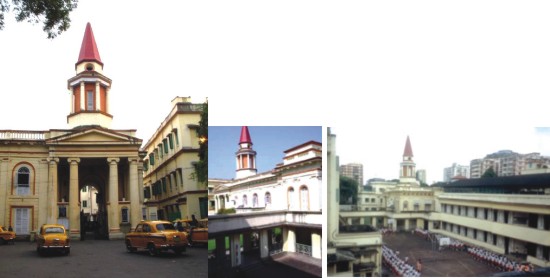| Flashback
Under the Same Sky: Part Ix
The Last Years before Partition
Perveen Ahmad
My father's transfer to Bengal had brought us to Lilloah, the officer's railway colony near Calcutta. The transfer was effected by complete services of moving the whole house with furniture and goods by the reliable and efficient 'goods train' so that the family could carry all their possessions with ease. We had large tin trunks and all the items were wrapped in old newspapers and gunny sacking. The crockery, our toys and books were carefully placed in crates to prevent damage. After we reached Howrah and settled into our new bungalow quarters, our parents first concern was to get us admitted into a good school.
We were already hearing talk about independence from the British Bengal and Bengalis were sensitive to political changes. The Quit India movement against the British was gaining momentum daily, as the crowds of Hindu and Muslim protestors swelled. It was one of the last displays of Indian national unity before the Calcutta riots of 1946 when Hindu-Muslim massacres gave vent to the animosity instigated both by Congress and the Muslim League.
As we had obtained our school transfer certificates before we left Allahabad, on presentation of these at Loreto Convent we got admitted, my sister to Class 3, and 1 in Class 1. Hindi as a subject had been introduced in Class 4 as a compulsory paper, as part of the move towards national identity, and my sister Cuckoo got a good grounding in the language before 1947. My brother went to St Agnes school which was co-education.

St. Thomas' Church. Behind it is the Loreto Convent, Calcutta.
photo credit: Shubhojoy, Picasa Web Albums
The Loreto School established in 1842 in Calcutta under the order of the Institute of the Blessed Virgin Mary, which dates back to 1604 in England and later Ireland, became one of the most influencing educational centres of British India. Anyone who passed through its lofty portals was moulded to the ideals of humanity based on the needs of the times. The Loreto Sisters tutored pupils, above all, to be good, honest, truthful children. Christian principles were imparted, but with such grace and subtlety, that character building took precedence in every class and every activity. The sisters took great care to supervise our manner of speech, decorum, hygiene and cleanliness, presentation and greetings towards elders and those from underprivileged backgrounds.
If ever British schools provided the building blocks for a new educational system for generations of Indians all over the subcontinent, then Loreto's motto to “Serve God with great love and liberty of mind” structured my life and shaped my liberal mind to meet the challenges of the future.
There were music classes at school and our prim and pretty teacher used to play on a black Grand Piano. Music classes were compulsory. We had song books (exercise books) in which we would copy down the verses taught to us. One song was Judy Garland's famous “Somewhere over the Raindow, skies are blue”. Also the beautiful Ave Maria. We never thought these were alien or parochial. They were just lovely music. Not all the class girls had good voices but were encouraged to join in and participate.
Our tiffin time at 11 a.m. was a festive occasion with the school girls chatting and giggling, opening up their tiffin boxes amidst a great clattering of spoons, glasses and plates. Every community ate at common tables and no one turned up their noses at the other's food.
Life continued much the same as we settled down in the cordoned boundaries of Lilloah Railway Colony. We had transported our pets, along with one luggage. It was a British influence to keep domestic pets and many Indian families kept pedigree dogs and cats, who were a source of fun and play around the house and on the lawns. My brother Zamir and I were very fond of animals and our parents encouraged us to have pets. We never kept caged birds, nor tied up our dogs. We spent time training them to be indoor pets, playful but disciplined, answering to our instructions and barking ferociously when we commanded them to shoo off the unwanted entrant at our gate!
In the days when it was the norm that 'children were seen but not heard' it was also quite normal that children were not exposed to the hard realities of life. Newspapers were few and reporting depended on slow communication by telegram and postal dispatches. The radio was still in its infancy and news of disasters and accidents reached days after the event occurred. 'Bazar-gup' was one means of gathering news based on word of mouth, information passed on by travelers coming to town from other districts and cities. It was customary that parents did not discuss all subjects in front of children, the idea being to protect them from harsh conditions, and not taint their innocent minds with hatred and cruelty.
The time between my early childhood in undivided India and our migration to West Pakistan is a criss cross of memories as we had moved our residences from Delhi, Allahabad, Kanpur, to Patna to Ahsansol and were finally caught up in the upheaval of Calcutta's horrendous events in 1946-1947. My father's last posting was in Lucknow from where we bid farewell to living in a united country.
Copyright (R) thedailystar.net 2008 |
